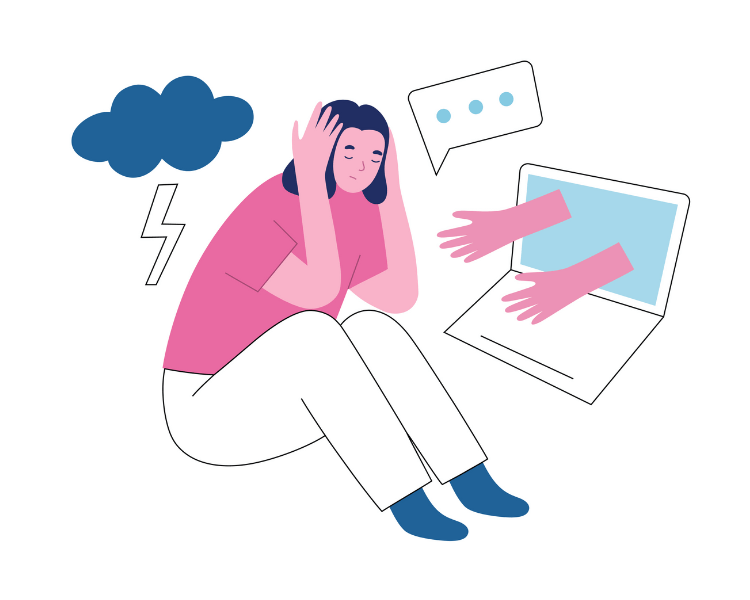
Helping Someone Survive Image-Based Abuse?
You can play an important role in helping a friend or family member survive this experience
How to step up if someone shares or threatens to share an intimate image or video of them
Sextortion Is A Serious Crime And You Can Help!
Regardless of someone’s age, individuals, whether young or old, need compassionate support to help them survive this experience since the fact is that not everyone makes it. They need help that acknowledges and validates their feelings and empowers them to take action regarding their situation.
By extending a supportive hand and assuring them of your willingness to listen without judgment, you can significantly influence their well-being and help them make it through these challenging circumstances.
Your presence and guidance can make a substantial difference in getting started on their journey toward healing and finding the support they need to cope effectively with Sextortion or blackmail, or revenge porn.
Need To Talk?
Call NOW!
988
Phone Help in the U.S. & Canada
Helping to Save a Life is No Small Thing! Yet that is exactly what Sextortion/Intimate Image Abuse Victims Need, Someone to Listen and Support them through this Incredible Betrayal and Abuse
Understanding the profound impacts of sextortion or image-based abuse is vitally important in providing support and care to those affected by these crimes.
When individuals have their intimate images or videos shared without consent, or worse, to blackmail them, the emotional toll can be devastating and seriously traumatic.
Feelings of betrayal, heartbreak, fear, anger, and humiliation often ensue, leaving the victim in a state of profound distress. This experience is compounded by the potential for critical comments or harassment from those who view the content, exacerbating feelings of shame and vulnerability. If left unsupported, the long-term consequences can be profound, affecting one’s sense of safety, trust, and self-esteem. Such trauma may lead to feelings of hopelessness, despair, and may even precipitate mental health challenges like depression and self-harm.
Please note that helping them to find support groups and counseling will be a big part of helping them through this. SCARS offers free, safe, and confidential support services to adults who have become victims of scams such as sextortion. SCARS support is available at support.AgainstScams.org For minors and children-related support visit: Victim & Family Support (missingkids.org) Additionally, you can find counseling or therapy resources at counseling.AgainstScams.org
Giving Support
It’s important to adopt a compassionate and non-judgmental approach when providing support to individuals who have experienced image-based abuse.
This entails listening attentively to their feelings and validating their experiences without placing blame or shame on the victim.
It is not necessary for you to talk, just listen and let them tell their story. When they need your feedback you will know.
Utilizing supportive language and reassurance can help create a safe space for them to express their emotions and seek assistance. Encouraging them to seek professional help from counselors or psychologists can provide invaluable support in navigating through the emotional aftermath of the abuse.
Additionally, assisting them in reporting the abuse and accessing resources for the removal of the content will help to empower them to reclaim their sense of agency and control. Together, by offering unwavering support and guidance, we can help survivors of image-based abuse navigate their path toward stability, healing, and recovery.
Emphasize This
There are key elements that you need to emphasize and reinforce with them:
- This was not their fault – the human brain is wired the way it is and sometimes it works against us.
- They were not stupid – they were vulnerable and the person they trusted (criminals) exploited that
- They are a survivor – they are going to make it through this even though it may be really hard, you are going to help them
- They are not alone – you and others understand what happened and are going to help them
- They are worthy – they matter and are worthy of being helped to survive this – Axios!
Consequences
What are the consequences of image-based abuse?
When an individual’s intimate image or video is shared or threatened to be shared without their consent, the repercussions can be profoundly detrimental and traumatic.
It’s typical for the person depicted in the content to experience feelings of betrayal, heartbreak, fear, anger, or humiliation. Additionally, they will grapple with profound shame or embarrassment, particularly if they were coerced into sharing nude or sexual material through deception.
For young individuals, they will also be concerned about potential repercussions from their family or school if the content is discovered. This can lead to thoughts of self-harm or suicide – take any comments about this seriously.
The situation can be made much worse by negative comments or harassment from those who view the intimate content, such as family or friends, underscoring the importance of being nonjudgmental and supportive throughout. Without adequate support, individuals subjected to this form of abuse can suffer long-term effects on their sense of safety, trust, and self-esteem – this is called psychological trauma. This can lead to serious mental issues, but at a minimum to feelings of hopelessness, despair, and could even precipitate depression, anxiety, and self-harm.
Research indicates that those who have experienced image-based abuse often turn to friends and family for support initially. However, the complex emotions and fears associated with the experience may make it challenging for them to disclose what has happened and seek assistance. You will have to be their guide or coach through this, leading them to get the images taken down and to counseling or therapy.
Blame
Who should be held accountable? The criminal(s) of course!
Remember, it’s critical to refrain from casting judgment, blame, or shame on individuals who have experienced image-based abuse – regardless of whether they initially shared the nude or sexual content. No one deserves to endure abuse of this kind ever. It is an assault, it is a violation, it is violence! Don’t forget that!
In the case of Children
If a child under your care is facing this situation, it’s important to maintain a calm demeanor, your anger at the criminal can easily be interpreted by your child as anger at them. Reacting with anger will only heighten their stress levels and cause them to shut down. Recognize that young people are navigating a world vastly different from that of most parents and caregivers. In today’s society, it’s commonplace for teenagers to engage in sending and receiving intimate images as they explore their sexuality. Also, remember that their brain is not yet fully developed and the emotional part has more control than in an adult.
Reassure them that you will continue to care for them, and provide support and affection – this is vital for their mental well-being and sense of worth.
Additionally, understand that sharing images without consent often occurs within the context of broader issues such as bullying, harassment, and familial abuse, or domestic violence. You are going to need to involve law enforcement in this and it will bring many difficult questions, but this is not about you, it is about saving a child or teen from the psychological damage that can come from this.
In the case of Adults
If someone you know is confronting this situation, remember that adults also engage in exchanging intimate images, especially in romance scams.
Regrettably, image-based abuse, encompassing phenomena like ‘revenge porn’ and ‘sextortion,’ is increasingly prevalent as our online presence expands and people ignore their moral obligations to others. This impacts individuals of any age, background, gender, sexual orientation, educational level, and financial status.
If someone confides in you that their intimate image or video has been shared or that another individual is threatening to do so, focus on their present circumstances rather than speculating about what they could or should have done differently. None of that matters. Helping them to survive this experience is your only goal, and that means helping them to report the crime, takedown the content, and get professional support to come out of this intact.
Helping
How can I help? There are numerous ways you can support your friend or family member.
Safety
Ensure their safety and prevent self-harm If they are in immediate danger or their well-being is at risk, call emergency services if you suspect they are in danger. Seriously, this will be hard, but if someone is talking about suicide or harming themself you may only get one or two clues. You have to act as if it is serious and they mean it. That may mean having them check into a local hospital for observation and support for a couple of days.
If they are experiencing suicidal thoughts or self-harm urges, encourage them to reach out to the Lifeline at 988 in the U.S. and Canada, or your local crisis hotline. Here is a list of Worldwide Crisis Hotlines: International Suicide Hotlines – OpenCounseling : OpenCounseling
Listen
Listen without passing judgment.
While you may experience shock, sadness, or anger, strive to remain composed, calm, and focus on hearing their story, their feelings, and experiences. Remember, they are not to blame. The individual (the criminal) who shared their image or video, or who is threatening them, is the one at fault.
Use Supportive Language
Avoid using phrases that may exacerbate their distress, such as:
- “You must feel so embarrassed”
- “I would feel like giving up if I were you”
- “This is going to be impossible to fix”
Instead, try phrases like:
- This isn’t your fault
- I’m glad you came to me
- I’m grateful that you reached out to me
- I understand how difficult it was for you to share this with me
- I know it took courage to tell me about this
- I know this is hard, but I am going to help you through every step
- This is hard but you can survive this
- Let’s figure this out together
- Let’s talk to…
If they are directing anger towards themselves, encourage them to consider the supportive words they would offer to a close friend in a similar situation, and help them apply that same compassion to themselves.
Please note that if this victim is underage, sharing of the images with you or anyone else can be a crime in itself. Possession of child intimate images is considered a violation of the law. Be careful about this.
Help have the Images or Videos Removed
Let them know that there are ways to have the images or videos removed, and help stop its spread online, or help stop the threats to share it. You could show them our information about image-based abuse and help them fill out the takedown online report form (see below.)
You can also help them create a hash (digital fingerprint) to prevent the image or video being uploaded elsewhere.
Understand this. This is a crime. If the individual is being blackmailed, and especially if they are a teen, some of their friends may be in the exact same situation. That is how these scammers work, they hook one, and then move one through their friends list! Reporting to the police is a requirement in all cases, but especially if they are underage.
Let them know that takedown services and government agencies can have their intimate photo or video removed and help stop its spread online, or help stop the criminal threats to share it. You could show them our information about image-based abuse and help them fill out our online report form (see below for takedown services and also support organizations that can help.)
Getting More Support
Let them know how to get more support. People in this situation often find it easier to talk with a counselor or psychologist than with a friend or family member, especially if they feel embarrassed or ashamed. You could help them contact a service offering counseling (see our Sextortion Resources & Support page) or a local counselor in their area..
You can also show them our websites and articles on how to manage the traumatic impacts of scams, sextortion, and image-based abuse. These are available on ScamPsychology.org ScamsNOW.com and on RomanceScamsNOW.com
Stay in Contact
Check how they’re doing, they will need support potentially any time. Look out for signs they may be depressed or anxious – these can appear immediately or sometime long after the experience. They can include changes in their:
- mood
- sleep patterns
- appetite
- energy levels
- willingness to socialize
- attendance at school or work
- willingness to talk openly about the crime
- avoidance or resistance
- increased anger
- signs of denial
If you notice any of these changes, talk with them about how a psychologist or counselor can help them, and the options available. SCARS provides a directory of counseling services worldwide at counseling.AgainstScams.org
Help Them Stay Socially Connected
It is important to avoid isolation since this breeds depression and more serious mental issues. Many people feel worried, embarrassed, and uncomfortable around others when they have experienced a crime such as sextortion or image-based abuse. They may need help to rebuild their confidence again, both offline and online. You can help them keep in contact with trusted friends or set up safe social opportunities that are likely to be positive.
After a bad experience like this, victims can have many different effects, including that they may be scared to go online again, or the opposite that they want to restore their social life too quickly. Staying offline may make them feel left out and more isolated from the people and experiences that usually make them feel part of a community. You could suggest they change their device or account settings so only a small group of people can contact them while they’re online, at least until they feel safe and confident again.
Activities
Trauma has a profound effect on people’s lives, their motivation, and desires. They will often shut down the things they used to enjoy, but you can encourage them to do things they enjoy.
If they’re feeling down, they may need a reminder about what they enjoy. Suggest doing something together that they like – for example, going to the movies, going for a walk, or sharing a meal. Music is complicated in these situations since the relationship that caused the abuse often involved certain music, they may not want to hear that or it may cause triggers that would be unwelcome.
You can do the same thing when they’re ready to go back online – for example, you could scroll their favorite posts with them, or if they’re a gamer you could play their favorite game together or ask them to teach you. You may want to schedule regular check-ins by direct message while they’re online until they get their confidence back.
Think About Yourself Too!
Trauma is contagious – it’s a real thing called ‘Vicarious Trauma’ that people who support those who have been traumatized can get. So get help for yourself too if you experience any changes in mood or behavior. All trauma is serious and can have lifelong consequences.
Helping someone else cope with these crimes can be very stressful. If you find it hard to handle on your own, reach out to a counseling or support service.
Sextortion Menu
- Sextortion Basics
- For Teen Guys – Sextortion Scams – What Are They? How To Survive Them?
- For Teen Girls – Sextortion Scams – What Are They? How To Survive Them?
- Surviving Sextortion / Sexual Photo Blackmail
- When Sextortion Goes Wrong – When Scammers Post Those Photos
- Helping Someone Survive Sextortion/Blackmail
- Sextortion Support Resources Worldwide
- Getting Photos & Video Removed Using Copyright
Takedown Services
- If you’re under 18, you can use takeitdown.ncmec.org – a free online tool that prevents your image or video from being shared on platforms such as Facebook, Instagram, TikTok, Yubo, OnlyFans, and Pornhub.
- If you’re 18 or older, you can use StopNCII.org – a free online tool that prevents your image or video from being shared on platforms such as Facebook, Instagram, TikTok, Bumble, OnlyFans, and Reddit.
More Sextortion Resources
- USA – Sextortion: What Kids and Caregivers Need to Know — FBI
- USA – Financially Motivated Sextortion — FBI
- AUSTRALIA – Dealing with sexual extortion | Australia eSafety Commissioner
- CANADA – Cybertip.ca
- Thorn – Stop Sextortion – Get Help
- Get Help Now – Cyber Civil Rights Initiative
- USA – National Center For Missing & Exploited Children
- Take It Down Tool
• Tool: takeitdown.ncmec.org
• PSA: youtube.com/watch?v=pAaXbBzVdJE - What to do:
• missingkids.org/theissues/sextortion - Request Victim/Family Support
• email: gethelp@ncmec.org - Report to the CyberTipline and Survivor Services will reach out with additional resources: cybertipline.org
- Take It Down Tool
- USA/CANADA – National Crisis Hotline
- Call 988 or Text 4HOPE to 741741
- https://www.crisistextline.org/ for access to a trained counselor
- AUSTRALIA – 24/7 helplines – free and confidential:
- If you’re 25 or younger, you can call or chat online with Kids HelplineExternal link (1800 55 1800).
- If you’re 18 or older, you can call, text or chat with LifelineExternal link (13 11 14).
- USA – FBI “How Can We Help You”: https://www.fbi.gov/how-we-can-helpyou/safety-resources/scams-andsafety/common-scams-and-crimes/sextortion
- ICAC Task Force Contacts: https://icactaskforce.org/TaskForceContacts








